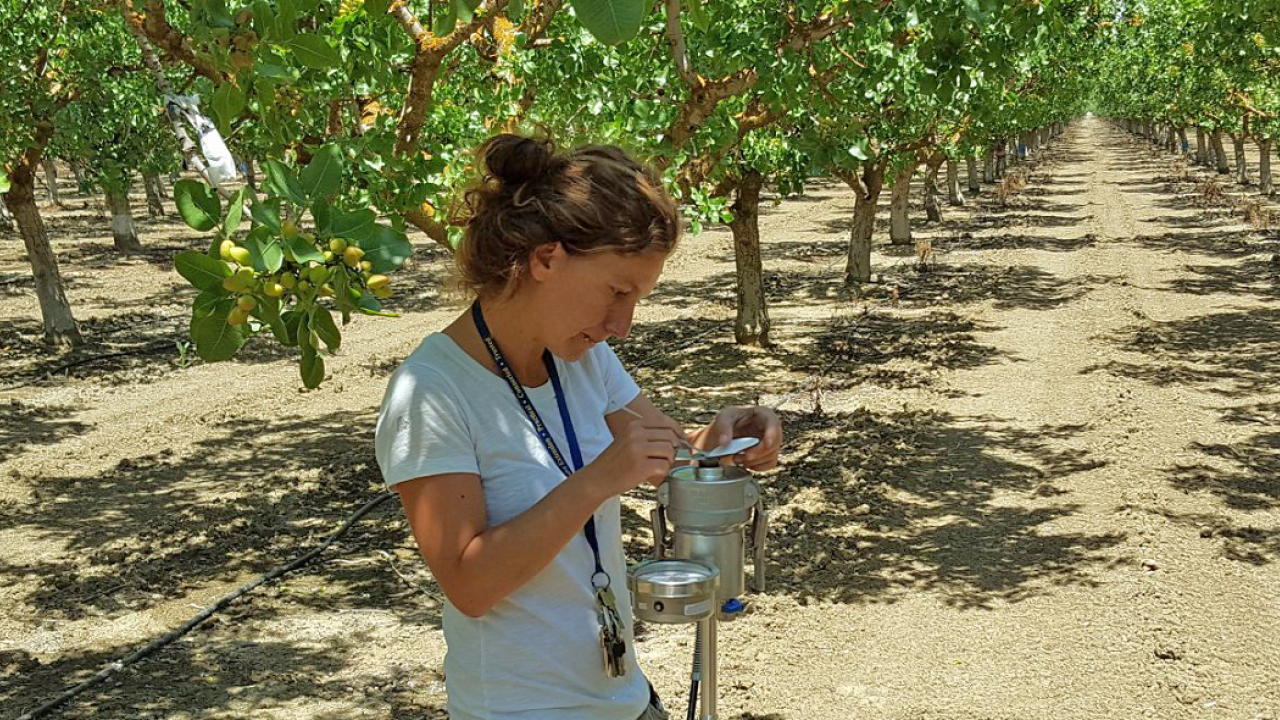
Giulia Marino: New Plant Sciences Faculty and Cooperative Extension Specialist
Expert on tree physiology in orchard systems

Giulia Marino, a crop physiologist, is the new UC Cooperative Extension (UCCE) Specialist in Orchard Systems, and a faculty member in the Department of Plant Sciences at the University of California, Davis (UC Davis). She is primarily based at the UC Kearney Agricultural Research and Extension Center in Parlier, California, and has a second office in Wickson Hall at UC Davis.
Marino's research focus is tree physiology and its impact on productivity, sustainability, and competitiveness of fruit and nut orchard production systems in a changing global scenario.
This includes:
- Understanding the impact of abiotic stresses associated with climate change, water scarcity, and soil degradation on orchard productivity and water use efficiency.
- Studying the physiological basis of perennial crop vegetative and bearing patterns and how it is affected by sink-source relationships and carbohydrate dynamics.
- Characterizing the physiological and horticultural potential of genetic resources to adapt to changes in agricultural systems such as increasing planting density and level of mechanization.
Methods space from the use of proximate and remote plant-based continuous sensing techniques to classical physiological and biometeorological measurements. Main outcomes are physiologically-based innovative orchard management strategies.
“I use physiological parameters to develop applied horticultural management practices,” said Marino. “Focusing on tree physiology allows me to help improve the production efficiency of orchard systems, especially where there are limited resources and challenges such as water availability, soil quality, high salinity levels, and a changing global scenario.”
Current Research
Marino is currently studying the correlation of pistachio nut growth and ripening with temperature and crop load in orchards in Woodland, California, and at Kearney.
“This information will help growers to better predict hull maturity and shell splitting patterns and allow the industry to understand when nuts become susceptible to navel orangeworm, the most damaging pest in California pistachio production,” Marino said.
A second study in pistachios will examine how salinity, boron, and hypoxia (low oxygen associated with salinity) impact young trees' growth and water use. In cherries, Marino is working to understand the physiological impact of traditional rest-breaking agents on tree seasonal carbohydrates dynamics to improve effectiveness of their applications under warmer conditions caused by climate change.
These research projects are built in collaboration with UCCE advisors and specialists, and UC professors, and are funded by the California Pistachio Research Board and the California Cherry Board.
She has additional research projects under discussion with professors Barbara Blanco-Ulate (postharvest biologist/physiologist) and Brian Bailey (crop/plant modeler), both in Plant Sciences at UC Davis, and Cooperative Extension specialist Selina Wang (organic chemist) in the Department of Food Science and Technology at UC Davis.
Prior to joining UC Davis and UC ANR, Marino was a postdoctoral researcher in the Department of Land, Air and Water Resources at UC Davis, where she studied pistachio water use and tree performance under saline-sodic conditions. Marino earned a doctorate degree in fruit and forestry tree systems and master's and bachelor's degrees in agricultural science, all from the University of Palermo in Italy. In graduate school in Italy, her research was primarily on olive and pistachio production.
Why University of California?
“The University of California is the optimum place to develop an agricultural research program,” said Marino. “I’m surrounded by the best scientists on these topics at UC Davis and Cooperative Extension, and located in the best place where nuts and fruit crops grow.”
Marino did not have an agricultural background as a child, and she chose the study of science on her own. While a child, she asked for a microscope, and using the microscope to study her hand, hair strands, and leaves, she knew she would pursue a science path. When she was older she discovered applied agriculture, and knew that it would be very important to the future since people will always need to eat.
“There is a strong connection here in California between research and extension,” Marino said, “so the practical research I do is useful to people and the agricultural industry.”
In her spare time, Marino spends much of her time outdoors.
“I love nature,” she said. “When I have time, I go hiking and scuba diving, and once I’m established here, I’d like to find time to play soccer again. But best of all,” she added with a warm smile, “I love trees!”
* Content from UC ANR press release by Jeannette Warnert.
